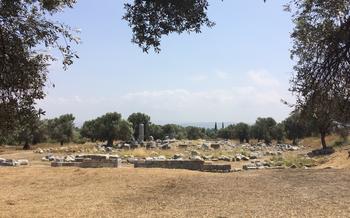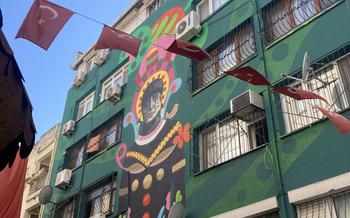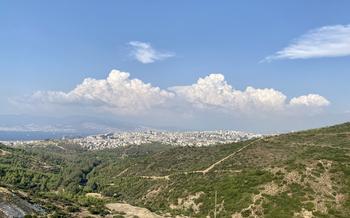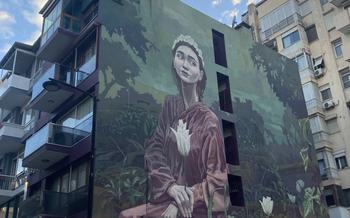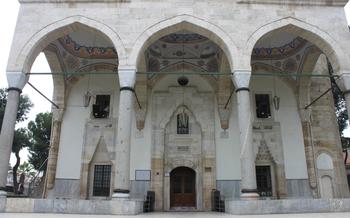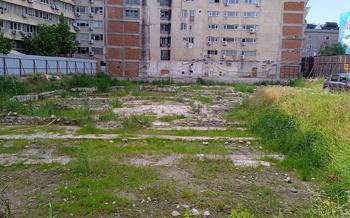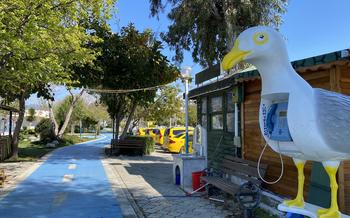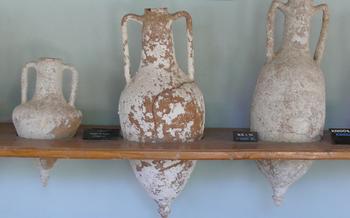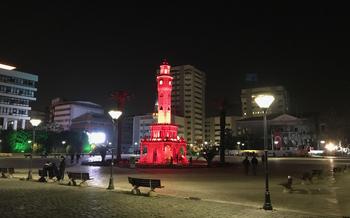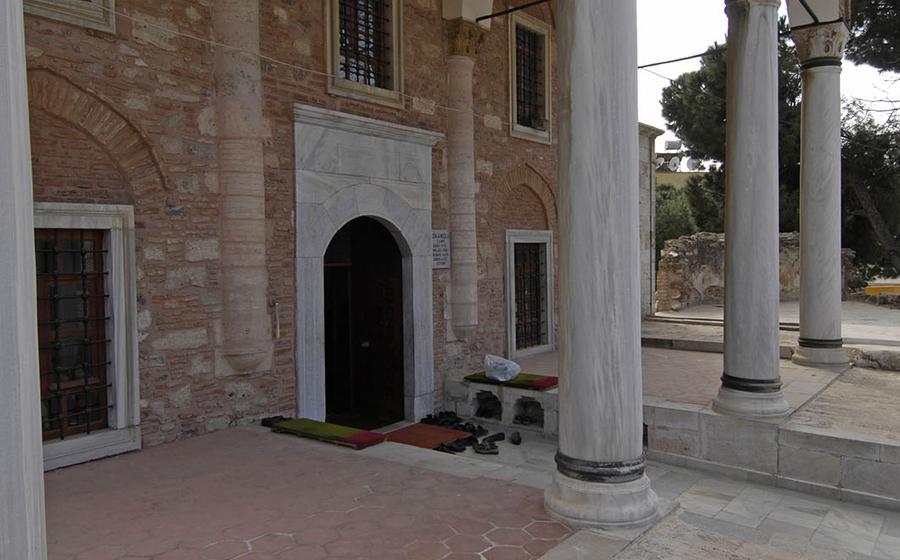
Miletus Ancient City
- Historical Significance
- Sacred Sites
- Philosophical Legacy
- Everyday Life
- Cultural Heritage
- Natural Beauty
- Modern-Day Miletus
- Getting There
- Where to Stay
- Where to Eat
- What to Buy
- Things to Do Nearby
- Travel Tips
- Insider Tip
- Insider Tip: Unveiling the Hidden Gem of Miletus
Historical Significance
Miletus, an ancient city nestled on the western coast of Turkey, holds immense historical significance as a prominent center of the Ionian League. Its strategic location as a thriving port city facilitated maritime trade, cultural exchange, and intellectual pursuits. The city served as an influential hub connecting the Greek world with the vast expanse of the Mediterranean.
Miletus's contributions to ancient Greek civilization were profound. As a birthplace to notable philosophers, including Thales, Anaximander, and Anaximenes, it became a cradle of philosophical thought. These thinkers challenged traditional beliefs and laid the groundwork for scientific inquiry and rational explanation. The Milesian School of Philosophy emphasized the significance of observation, experience, and logical reasoning, leaving an enduring mark on Western philosophical traditions.
Moreover, Miletus played a crucial role in the development of Greek democracy. As one of the leading cities of the Ionian League, it embraced democratic principles and participated in the Ionian Revolt against Persian rule. This struggle for autonomy exemplified the city's commitment to self-governance and laid the groundwork for the democratic ideals that would later shape the Athenian democracy.
Sacred Sites
Miletus was a deeply religious city, and its sacred sites played a crucial role in the lives of its inhabitants. The most significant of these sites was the Temple of Apollo, a magnificent structure that towered over the city. Dedicated to the god Apollo, the temple was a place of worship, pilgrimage, and divination. People from all over the ancient world flocked to Miletus to seek guidance and blessings from the oracle of Apollo, who was believed to reside within the temple.
The Temple of Apollo was not just a religious center but also a symbol of the city's power and prestige. Its grand architecture, intricate sculptures, and lavish offerings reflected the wealth and piety of the Milesians. The temple complex included an altar, a colonnade, and a treasury where the city's riches were stored.
Other sacred sites in Miletus included the Temple of Athena, the Temple of Dionysus, and the Sanctuary of Demeter. These temples were dedicated to various deities and served as places of worship and ritual for the city's inhabitants. The people of Miletus celebrated religious festivals and ceremonies throughout the year, honoring their gods and goddesses and seeking their favor.
Philosophical Legacy
Miletus holds a prominent place in the history of philosophy as the birthplace of some of the most influential ancient Greek thinkers. The city's intellectual and philosophical legacy has left an enduring mark on Western thought. Among the notable philosophers born in Miletus are Thales, Anaximander, and Anaximenes, who are collectively known as the Milesian school.
Thales, considered one of the Seven Sages of Greece, is credited with being the first philosopher to seek rational explanations for natural phenomena, rather than relying on myth or religion. He proposed that all matter is composed of a single substance, which he identified as water. Anaximander, Thales' student, expanded on these ideas, suggesting that the primary substance is actually an infinite and undefined entity called the apeiron, from which all things originate and to which they eventually return. Anaximenes, another student of Thales, believed that air was the fundamental element from which everything else was formed.
The Milesian philosophers' emphasis on rational inquiry and natural explanations laid the foundation for the development of Greek philosophy. Their ideas challenged traditional beliefs and opened up new avenues of thought, influencing later philosophers such as Pythagoras, Heraclitus, and Democritus. The Milesian school's legacy extends beyond ancient Greece, as their ideas were later adopted and adapted by Roman and Islamic philosophers, contributing to the development of modern scientific thought.
Visiting Miletus, one can't help but feel a sense of awe and inspiration as one walks in the footsteps of these great thinkers. The city's ancient ruins, including the agora where philosophical discussions once took place, serve as a reminder of the profound impact that Miletus has had on the intellectual landscape of the world.
Everyday Life
The daily lives of the people of Miletus were a captivating tapestry of customs, traditions, and occupations that reflected the city's vibrant culture. The city's strategic location as a port fostered a thriving economy, with trade being the lifeblood of the city. Merchants from across the Mediterranean Sea converged in Miletus, exchanging goods and ideas that shaped the city's cosmopolitan character.
Agriculture played a significant role in the economy, with the fertile plains surrounding Miletus producing an abundance of crops. Farmers tended to their fields, growing wheat, barley, and olives, which formed the staples of the Milesian diet.
The city was also renowned for its manufacturing prowess. Artisans crafted intricate textiles, pottery, and metalware, showcasing their exceptional skills and contributing to the city's economic prosperity.
The social structure of Miletus was complex, with different social classes playing distinct roles in society. The upper class consisted of wealthy landowners, merchants, and government officials, who held significant power and influence. The middle class comprised artisans, traders, and professionals, who formed the backbone of the city's economy. The lower class consisted of laborers, slaves, and the poor, who performed essential tasks to keep the city functioning.
Despite the social stratification, the people of Miletus shared a strong sense of community and civic pride. They gathered in the agora, the city's central square, to discuss matters of politics, trade, and philosophy. The city's festivals and religious ceremonies brought people together, fostering a sense of unity and belonging.
One anecdote that encapsulates the vibrant spirit of Miletus is the story of Thales, one of the city's most famous philosophers. Known for his wit and wisdom, Thales was approached by a group of fishermen who had caught nothing all day. Undeterred, Thales advised them to cast their nets in the opposite direction. To their astonishment, the fishermen returned with a bountiful catch, demonstrating the power of thinking outside the box and challenging conventional wisdom.
Cultural Heritage
Miletus boasts a rich and diverse cultural heritage that has left an indelible mark on the world. It was a hub of artistic and intellectual activity, and its legacy continues to influence modern-day culture. The city's vibrant art scene produced exquisite sculptures, mosaics, and paintings that showcased the extraordinary talent of its artisans. These artworks adorned temples, public buildings, and private homes, adding to the city's visual splendor.
Miletus also had a thriving literary tradition. Its writers, poets, and historians contributed significantly to the development of Greek literature. Their works explored diverse themes, from mythology and philosophy to love and loss. These literary creations were widely read and admired throughout the ancient world and continue to be studied and appreciated in modern times.
Furthermore, Miletus was renowned for its musical prowess. Its musicians and composers created enchanting melodies that filled the streets and theaters of the city. Music played an integral role in religious ceremonies, festivals, and social gatherings, bringing joy and unity to the community. The legacy of Milesian music lives on in the rich musical traditions of the region.
The cultural heritage of Miletus is a testament to the city's profound contributions to ancient Greek civilization. Its art, literature, and music continue to inspire and enchant people worldwide, showcasing the enduring power of its cultural legacy.
Natural Beauty
Miletus was blessed with a stunning natural setting that complemented its cultural and historical significance. The ancient city was surrounded by picturesque beaches, lush forests, and majestic mountains, creating a harmonious blend of natural beauty and human achievement.
In the west, the azure waters of the Aegean Sea lapped at the shores of Miletus, inviting visitors to swim, sunbathe, and indulge in water sports. The sandy beaches stretched for miles, providing ample space for relaxation and recreation.
To the east, the Dilek Peninsula, a protected national park, beckoned with its verdant forests, rugged cliffs, and secluded coves. Visitors could explore the park's hiking trails, marvel at the diverse flora and fauna, and enjoy breathtaking views of the coastline.
In the distance, the snow-capped peaks of the Menteşe Mountains rose majestically, adding a dramatic backdrop to the ancient city. These mountains offered opportunities for hiking, climbing, and paragliding, allowing visitors to experience the natural beauty of the region from a different perspective.
The combination of sea, forest, and mountains created a unique microclimate in Miletus, making it a year-round destination. The mild winters and warm summers attracted visitors from all over the ancient world, who sought to experience the beauty and tranquility of this remarkable place.
Modern-Day Miletus
The modern village of Milet, built on the site of the ancient city, stands as a testament to the enduring legacy of Miletus. While the ancient ruins dominate the landscape, the modern town offers a glimpse into the daily lives of the people who call this historic place home.
Milet village is a small, charming community with a population of around 3,000 people. The villagers are proud of their heritage and work hard to preserve the ancient ruins while accommodating modern development. The town has a relaxed atmosphere, and visitors can enjoy strolling through the narrow streets, browsing the local shops, and sampling the delicious local cuisine.
Preserving the ancient ruins while accommodating modern development is a delicate balance. The Turkish government and local authorities have made significant efforts to protect the site's cultural heritage. They have implemented strict regulations on construction and development in the area, ensuring that new buildings do not overshadow or damage the ancient ruins.
Despite these efforts, the encroachment of modern development remains a challenge. The town is growing, and there is a need for new housing, businesses, and infrastructure. Striking a balance between preserving the past and embracing the future is essential for the sustainable development of Milet.
For visitors, the modern town of Milet offers a range of accommodation options, from budget-friendly guesthouses to comfortable hotels. There are also several restaurants serving traditional Turkish cuisine, as well as shops selling local handicrafts and souvenirs.
Milet is a fascinating place to visit, offering a unique blend of ancient history and modern life. By exploring the town and interacting with the locals, visitors can gain a deeper understanding of the rich cultural heritage of Miletus and its enduring legacy.
Getting There
Reaching Miletus is a breeze, with multiple transportation options available. To fully immerse yourself in the region's charm, consider taking a scenic train ride from the vibrant city of Izmir. The journey offers breathtaking views of the countryside, passing through picturesque villages and lush landscapes. Alternatively, hop on a comfortable bus from major cities like Istanbul or Ankara. These buses provide a reliable and affordable way to get to Miletus, allowing you to sit back and enjoy the ride.
For a more personalized experience, rent a car and embark on a road trip. The well-maintained highways offer a smooth and scenic drive, giving you the freedom to stop at charming towns and hidden gems along the way. Just remember to plan your route in advance, as the drive from major cities can take several hours.
To make the most of your visit, plan your trip during the shoulder seasons (spring or autumn) when the weather is pleasant, and the crowds are smaller. Summer months can be hot and crowded, while winter can bring unpredictable weather conditions.
Remember to book your accommodations and tours in advance, especially during peak season. This will ensure you secure the best deals and avoid any last-minute disappointments. For budget-savvy travelers, consider staying in nearby towns or villages, where prices tend to be lower.
Where to Stay
When planning your trip to Miletus, choosing the right accommodation is essential to ensure a comfortable and enjoyable stay. Whether you prefer the convenience of a hotel, the charm of a guesthouse, or the privacy of a vacation rental, Milet offers a range of options to suit every budget and preference.
For those seeking a luxurious and convenient stay, the Milet Hotel is an excellent choice. Situated in the heart of the modern town, the hotel offers stunning views of the ancient ruins and the Aegean Sea. With its modern amenities, spacious rooms, and attentive service, the Milet Hotel is ideal for travelers seeking a touch of elegance and comfort.
If you prefer a more intimate and authentic experience, consider staying at one of the charming guesthouses in Milet. These small, family-run establishments offer a glimpse into the local culture and provide a warm and welcoming atmosphere. Many guesthouses are located within walking distance of the ancient city, allowing guests to explore the ruins at their leisure.
For travelers seeking a more independent and private stay, vacation rentals offer a great option. From cozy apartments to spacious villas, there are various rental properties available in Milet. This option is ideal for families or groups traveling together, as it provides the flexibility to cook meals and enjoy the comforts of home.
Whichever accommodation option you choose, booking in advance is recommended, especially during the peak tourist season. This will ensure that you secure your preferred lodging and avoid any disappointment. Additionally, consider exploring online travel agencies or local websites to find the best deals and discounts on accommodation in Milet.
Where to Eat
When it comes to food, Milet will not disappoint you. The town features a range of restaurants and eateries that serve delicious local cuisine and traditional dishes. Fresh seafood is a must-try, considering the town's proximity to the sea. Grilled meats and vegetarian options are also widely available.
To get a taste of authentic Milet cuisine, venture into the narrow streets and seek out hidden gems frequented by locals. These small, family-run eateries often serve the most delicious and affordable food. Don't be afraid to ask for recommendations from your hotel or tour guide.
For a memorable dining experience with a stunning view, head to one of the many restaurants along the waterfront. Enjoy fresh seafood dishes while taking in the breathtaking views of the Aegean Sea.
Here are some specific recommendations:
- Milet Balıkçısı: This charming restaurant offers a wide variety of fresh seafood dishes, including grilled fish, calamari, and shrimp. The outdoor seating area provides a beautiful view of the harbor.
- Meze Evi: For a taste of traditional Turkish meze (small plates), head to Meze Evi. This cozy restaurant serves a variety of delicious dishes, including hummus, baba ganoush, and stuffed grape leaves.
- Köfteci Ali Usta: If you're looking for a quick and affordable meal, Köfteci Ali Usta is the place to go. This local favorite serves delicious grilled meatballs and kebabs at a very reasonable price.
What to Buy
When visiting Miletus, take the opportunity to support local artisans and businesses by purchasing unique handicrafts, souvenirs, and products. The town offers a variety of markets, shops, and boutiques where visitors can find authentic items that reflect the region's rich cultural heritage.
One of the must-buy items in Miletus is the traditional Turkish carpet. Handcrafted by skilled weavers using intricate designs and vibrant colors, these carpets are not only beautiful but also durable and long-lasting. Visitors can find a wide selection of carpets in different sizes, patterns, and price ranges to suit every taste and budget.
Another popular souvenir from Miletus is handmade pottery. Local artisans create a variety of ceramic items, including plates, bowls, vases, and decorative pieces. These items are often adorned with traditional Turkish motifs and patterns, making them unique and visually appealing.
Visitors can also find a variety of jewelry, clothing, and accessories made by local artisans. These items are often made using traditional techniques and materials, such as silver, gold, and semi-precious stones. Whether you're looking for a unique necklace, a pair of earrings, or a hand-woven scarf, you're sure to find something special in Miletus.
When shopping in Miletus, be sure to visit the local markets, where you can find a wide variety of fresh produce, spices, and other goods. The markets are a great place to experience the local culture and interact with the friendly people of Miletus.
Things to Do Nearby
Apart from exploring the ancient ruins and attractions of Miletus, there are several other interesting places and activities to enjoy in the surrounding area. Here are a few suggestions to make your trip even more fulfilling:
-
Priene: Located just a short drive from Miletus, Priene is another well-preserved ancient city that offers stunning views of the surrounding countryside. Explore its impressive ruins, including the Temple of Athena, the agora, and the theater.
-
Didyma: Home to the Oracle of Apollo, Didyma was an important religious center in ancient times. Visit the ruins of the Temple of Apollo, one of the largest and most magnificent temples in the Greek world, and learn about the rituals and prophecies that took place here.
-
Bafa Lake: This beautiful lake, located a short distance from Miletus, is a popular spot for nature lovers and birdwatchers. Take a boat tour to explore the lake's tranquil waters and spot a variety of bird species, including flamingos, pelicans, and herons.
-
Dilek Peninsula National Park: This stunning national park, located just south of Miletus, offers a diverse landscape of forests, beaches, and mountains. Hike through the park's trails, swim in the crystal-clear waters of the Aegean Sea, or simply relax and enjoy the breathtaking scenery.
-
Soke: This vibrant town, located a short drive from Miletus, is known for its lively markets, delicious cuisine, and thermal springs. Visit the Soke Bazaar to shop for local handicrafts and souvenirs, indulge in a traditional Turkish meal at one of the many restaurants, or relax and rejuvenate in the town's natural hot springs.
Travel Tips
When visiting Miletus, it's essential to come prepared and respectful of the local culture. Pack light, comfortable clothing suitable for walking on uneven surfaces and exploring ancient ruins. Remember your sunscreen, hat, and sunglasses to protect yourself from the Mediterranean sun.
Before your trip, familiarize yourself with Turkish customs and traditions. Greetings are essential, so learn to say "Merhaba" (hello) and "Gule Gule" (goodbye) in Turkish. Respect local customs, such as removing your shoes when entering a mosque or home.
Stay safe by being aware of your surroundings and valuables. Avoid walking alone at night, and keep your belongings close. Learn a few basic Turkish phrases to communicate with locals who may not speak English.
To immerse yourself in the local culture, visit the weekly market, where you can find fresh produce, handmade crafts, and souvenirs. Engage with the friendly locals, who are always happy to share stories about their town and culture. Savor the delicious local cuisine, especially the freshly caught seafood and traditional Turkish dishes.
Insider Tip
For a truly unique experience, visit the ancient quarries located just outside of Miletus. These quarries were once used to extract the white marble that was used to build the city's magnificent structures. Explore the labyrinth of tunnels and chambers, and admire the intricate carvings left behind by the ancient workers. It's a hidden gem that offers a glimpse into the city's rich history and architectural prowess.
Insider Tip: Unveiling the Hidden Gem of Miletus
Amidst the awe-inspiring ruins of Miletus, there lies a secret spot known only to a select few. Tucked away from the main tourist paths, this hidden gem offers a glimpse into the city's rich history and natural beauty.
Venture off the beaten track and follow a winding path that leads to a secluded cove, where the ruins of an ancient temple stand majestically overlooking the sparkling Aegean Sea. This hidden sanctuary, once a place of worship for the ancient Milesians, exudes an air of tranquility and invites visitors to immerse themselves in the city's spiritual past.
As you explore the temple ruins, let your imagination transport you back in time to witness the rituals and ceremonies that once took place within these sacred walls. Feel the energy of the ancient Greeks as they paid homage to their gods and sought divine guidance.
After exploring the temple, take a moment to relax on the nearby beach, where you can soak up the Mediterranean sun and enjoy the gentle sound of the waves. Let the serenity of this hidden paradise wash away your worries as you contemplate the wonders of Miletus and the enduring legacy of its people.
Whether you're a history buff, a nature lover, or simply seeking a unique and unforgettable experience, this hidden gem in Miletus is sure to leave a lasting impression. So, step off the beaten path, embrace the spirit of adventure, and discover the secrets that this ancient city holds.
